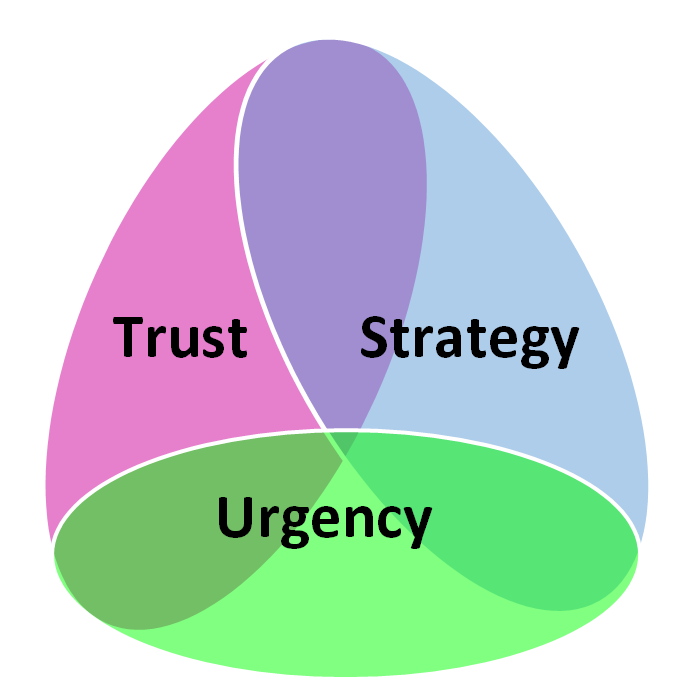We all know the evolution theory of Darwin: “It is not the strongest of the species that survive, but the most adaptable!” So why are people so reluctant to change? Probably because the various conditions for effective change do not coincide. Change is, at first, always a synonym for big discomfort. It does not come as a natural thing. But change is not an option, it is a real necessity. So how to create a culture of change?
People are more open for change when they can help defining and realising it.
We need to acknowledge that there are 2 phases in the change process. The first is initiating change, the second is making it sustainable. The condition for initiating real change resides in the definition of a clear vision and strategy. People must clearly understand why the required change is that important. The vision and strategy must be broadly understood and lived by! We can also call this the motivational goal, triggering interpreneurship amongst a large number of employees. Several studies proved that people are more open for change when they can help defining and realising it. A big responsibility for the management, who better not underestimate the time the process to explain, convince and adhere takes.
To speed up the process, creating a sense of urgency is very useful. This is the second condition. Sometimes this is even called the “burning platform”. This is not always the doom scenario, but it can be. It is the difference between ‘If we do not” compared to ‘If we would be able to”. It is about bringing a possible future (hypothesis) in the now, making it tangible. You need a stopping power, stimulating self-reflection. But there is needed more than just a clear strategy and a sense of urgency.
A ‘burning platform’ doens’t need to be a doom scenario, but it can be.
Trust is the third fundament for change. The advantages of companies with a trust culture are multiple; they increase their speed and decrease their costs. Low-trust companies on the other hand are often bureaucratic, have disengaged personnel and politics lead the daily lives. Take a look at companies that are in a deep crisis. People do not trust one another. They have found the perfect defence mechanism and that is blaming others for the malfunctioning of their business. When people get divided, the end is near. It is by acting as a group that companies can conquer the biggest challenges. And the condition for working together as a strong team, is mutual trust. Without trust, collaboration is merely cooperation.

Some people state that HR will become redundant when it comes to installing the culture of change. I believe this is a wrong conclusion. It is a matter of revaluating the power of soft skills, so often under pressure in times of crisis. So let us first tackle and adjust this view on the world. Management should acknowledge the equal importance between hard and soft skills in an HR department. There is no hierarchy, both skills are crucial. Hard skills involve specific knowledge and abilities, whereas soft skills focus on attributes and personality traits. These have to do with emotional intelligence and behaviour: communication, problem-solving, and flexibility to just name a few. So when companies only want to assure the hard skills in the HR department, it is clear that their HR cannot play the crucial role needed in change trajectories. Who is to blame?
HR people who excel in soft skills are in fact the real change agents. They have acquired the necessary education and training; it is their field of competence. They are mandated in time and means to make change happen. So to play that crucial role, they must understand the business. Because they are trainers and mentors for the managers who are in the business. These often lack time, did not get the right training and – even more important – often do not have the correct mindset nor soft skills. What is more is that soft skilled HR professionals have a ‘human’ radar for potential issues or opportunities that arise. They can objectively recommend to adjust certain situations to further facilitate the process. And in their role, they are also obliged to escalate and tackle the real issues and be a mirror for the management. This means that a very open mindset from the management as well as mutual trust are required to succeed.
Let employees act like a leader in their domain, offering learning and development opportunities.
Often change trajectories coincide with a performance management approach. It is a way in which employees are acting like a leader in their domain, making them self-aware and self-motivating. Being true to people. This implies a management giving trust, freedom and responsibility to employees, putting talent management central and adjusting the comp & ben. Focussing on (self)learning and development, offering an inspiring workplace, installing a new way of working, watching over employees’ resilience and stimulating a maximum of collaboration! Richard Branson’s quote summarises this very clearly : “Do not tolerate brilliant jerks, the cost to teamwork is too high!” Without the feeling of togetherness and real collaboration, no company can righteous address tomorrow’s challenges.


